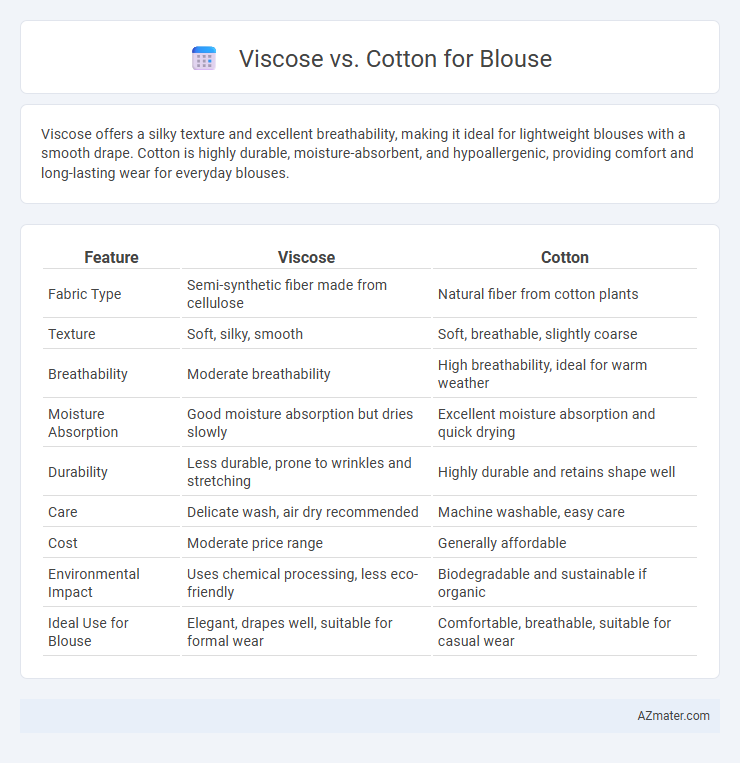Viscose offers a silky texture and excellent breathability, making it ideal for lightweight blouses with a smooth drape. Cotton is highly durable, moisture-absorbent, and hypoallergenic, providing comfort and long-lasting wear for everyday blouses.
Table of Comparison
| Feature | Viscose | Cotton |
|---|---|---|
| Fabric Type | Semi-synthetic fiber made from cellulose | Natural fiber from cotton plants |
| Texture | Soft, silky, smooth | Soft, breathable, slightly coarse |
| Breathability | Moderate breathability | High breathability, ideal for warm weather |
| Moisture Absorption | Good moisture absorption but dries slowly | Excellent moisture absorption and quick drying |
| Durability | Less durable, prone to wrinkles and stretching | Highly durable and retains shape well |
| Care | Delicate wash, air dry recommended | Machine washable, easy care |
| Cost | Moderate price range | Generally affordable |
| Environmental Impact | Uses chemical processing, less eco-friendly | Biodegradable and sustainable if organic |
| Ideal Use for Blouse | Elegant, drapes well, suitable for formal wear | Comfortable, breathable, suitable for casual wear |
Introduction to Viscose and Cotton Fabrics
Viscose, a semi-synthetic fiber made from regenerated cellulose, offers a silky feel and breathability ideal for blouses, while cotton, a natural fiber derived from cotton plants, is renowned for its softness, durability, and moisture-wicking properties. Viscose fabric drapes elegantly and retains vibrant colors, making it popular for stylish and flowing blouse designs. Cotton fabric provides comfort, hypoallergenic qualities, and easy care, ensuring blouse longevity and daily wearability.
What Is Viscose? Key Characteristics
Viscose is a semi-synthetic fiber derived from natural sources like wood pulp, known for its silk-like feel and breathable properties. It offers excellent drape, smooth texture, and vibrant color retention, making it an ideal choice for blouses requiring softness and fluidity. Unlike cotton, viscose tends to be more lightweight and moisture-absorbent, providing comfort and elegance in warm weather garments.
What Is Cotton? Key Characteristics
Cotton is a natural fiber harvested from the seed hairs of the cotton plant, renowned for its breathability, softness, and moisture-wicking properties, making it a popular choice for blouses. Key characteristics include high absorbency, durability, and hypoallergenic qualities, which provide comfort and ease of care. Its natural texture allows for excellent dye retention, resulting in vibrant colors and versatile fabric options for various blouse styles.
Comfort and Breathability Comparison
Viscose fabric offers a smooth, silky texture that enhances comfort by draping softly against the skin, while cotton provides natural breathability due to its porous fiber structure, which helps regulate body temperature effectively. Both materials excel in moisture absorption, but cotton tends to be more breathable, making it ideal for hot and humid climates, whereas viscose provides a cool feel with less air circulation. For blouse wearers prioritizing comfort, viscose offers a luxurious softness, but cotton's superior airflow ensures better overall breathability.
Durability and Longevity of Each Fabric
Viscose, a semi-synthetic fiber made from cellulose, offers a soft and smooth texture but tends to be less durable than cotton, showing wear and pilling over time. Cotton, a natural fiber, is highly durable with excellent breathability and maintains its strength through multiple washes, making it ideal for long-lasting blouses. When prioritizing longevity, cotton blouses generally outperform viscose due to their resistance to abrasion and better retention of fabric integrity.
Environmental Impact: Viscose vs Cotton
Viscose production involves chemical-intensive processes and deforestation, leading to significant environmental degradation compared to cotton, which is a natural fiber with a lower carbon footprint when organically grown. However, conventional cotton farming is water-intensive and relies heavily on pesticides, contributing to soil depletion and pollution. Sustainable practices in both viscose sourcing and organic cotton cultivation can reduce their environmental impacts, making eco-friendly choices critical for minimizing the blouse's ecological footprint.
Care and Maintenance Differences
Viscose blouses require gentle hand washing or delicate machine cycles with cold water to prevent fiber weakening and shrinking, while cotton blouses tolerate regular machine washing with warm water and higher durability. Viscose is prone to wrinkling and may lose shape after frequent washes, necessitating air drying flat or hanging, whereas cotton is more resilient, easily ironed, and can be tumble dried safely. Choosing between viscose and cotton depends on prioritizing delicate care versus ease of maintenance and fabric longevity in blouse wear.
Style and Appearance in Blouse Designs
Viscose offers a silky, smooth texture that enhances the flow and drape of blouse designs, creating an elegant and luxurious appearance compared to cotton. Cotton blouses typically exhibit a matte finish with a crisp, structured look, making them ideal for casual and classic styles. The sheen and fluidity of viscose contribute to more sophisticated and dressy blouse silhouettes, while cotton emphasizes comfort and breathability with a natural, timeless aesthetic.
Cost and Accessibility Factors
Viscose blouses are generally more affordable than cotton due to lower raw material and production costs, making them accessible for budget-conscious shoppers. Cotton blouses, while often pricier, offer greater durability and widespread availability in diverse styles and weights. Both fabrics are widely accessible in retail markets, but viscose's cost-effectiveness appeals to those prioritizing economy without sacrificing breathability and softness.
Which Is Best for Blouses: Viscose or Cotton?
Viscose offers a silky texture and excellent drape, making it ideal for flowy, elegant blouses, while cotton provides superior breathability and durability, ensuring comfort and easy maintenance. For blouses worn in warm weather or requiring frequent washing, cotton is often preferred due to its moisture-wicking properties and resistance to shrinkage. Viscose is best suited for dressier blouses where softness and sheen are prioritized over long-term wear and ease of care.

Infographic: Viscose vs Cotton for Blouse
 azmater.com
azmater.com